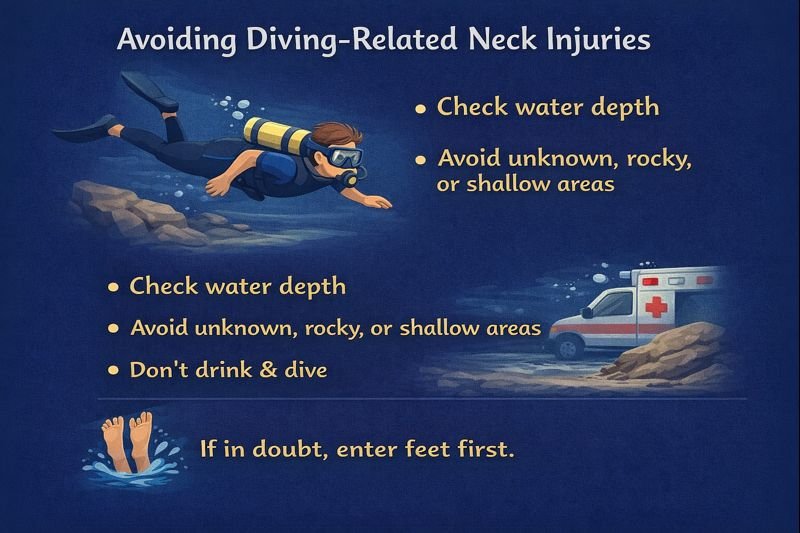Diving-Related Neck Injuries: Awareness, Risks & Prevention

Relevance in First Aid, Sport & Canadian Context
Diving happens in pools, lakes, rivers, and coastal environments across Canada. Youth and adults participate in diving through recreation centres, camps, tourism, competitive sport, and boating activities. Neck injuries in aquatic environments can be serious, especially when water depth or underwater structures are misjudged.
Scenario: Mild & Realistic
During a long weekend cottage trip, a teen running off a dock slipped and entered the water at an awkward angle. They surfaced holding their neck and reported discomfort. Friends discouraged further swimming and an adult arranged for a clinic visit. Imaging showed a soft-tissue strain that resolved with rest over time.
How Diving-Related Neck Injuries Occur
Neck injuries may result from:
-
Striking the bottom in shallow water
-
Contact with pool floors, lake beds, rocks, or submerged objects
-
Misjudging depth due to water clarity or slope
-
Entering the water at a steep angle
-
Collisions with diving boards, platforms, or docks
-
Rapid ascent or prolonged diving during scuba activities
Impact forces can affect vertebrae, discs, nerves, and supporting tissues.
Possible Symptoms (Awareness Only)
Neck injuries can involve both structural and neurological symptoms. Signs may include:
-
Neck pain or stiffness
-
Reduced range of motion
-
Bruising or swelling (sometimes delayed)
-
Tingling or altered sensation in limbs
-
Headache or dizziness
-
Visual changes
-
Nausea or feeling unwell
-
Weakness or impaired motor function
Symptoms vary widely. Some appear immediately; others develop over hours or days.
Risk Factors for Diving Environments
Higher risk situations may include:
-
Diving into unknown or cloudy water
-
Misreading sloped pool floors
-
Diving from boats, docks, or platforms
-
Presence of rocks or underwater structures
-
Competitive diving with repetitive entries
-
Scuba diving with rapid ascent or prolonged bottom time (risk of decompression illness)
Children, teens, and young adults are over-represented in recreational diving injuries due to activity level and risk-taking patterns.
Why Neck Injuries Require Medical Assessment
Neck injuries can affect:
-
Bones: sprains, fractures, dislocations
-
Soft tissues: ligaments, muscles, tendons
-
Neurological structures: nerves, spinal cord
Symptoms do not reliably predict severity. Healthcare evaluation can determine whether imaging, rest, or further care is required.
Prevention & Safe Practices
Prevention strategies may include:
-
Checking water depth before diving
-
Entering unknown water feet-first
-
Following pool and waterfront rules
-
Using docks and platforms responsibly
-
Supervising youth during water sports
-
Ensuring safe ascent and descent practices in scuba diving
-
Avoiding alcohol or impairment during water activities
Water can temporarily numb or cool tissues, masking early symptoms, so monitoring after impacts is beneficial.
Common Misconceptions
-
“If there’s no swelling, it’s fine.”
Swelling or bruising may appear hours later or the next day. -
“Minor scrapes mean minor injury.”
Visible abrasions may accompany deeper strains or nerve irritation. -
“Symptoms always show up in the water.”
Neurological effects may emerge once the diver is out of the water. -
“Only risky divers get hurt.”
Even cautious swimmers can misjudge depth or underwater hazards.
FAQ
1. Why are diving neck injuries taken seriously?
The neck protects the spinal cord. Damage can affect movement or sensation.
2. Do shallow pools cause most diving injuries?
Many recreational diving injuries involve shallow or sloped environments where depth is misjudged.
3. Can symptoms be delayed?
Yes. Some soft-tissue and neurological symptoms develop over time.
4. Is decompression illness related to neck injury?
Scuba diving can cause decompression illness, which may involve neurological symptoms. Medical assessment is required.
5. Are children at higher risk?
Youth and young adults participate frequently in diving activities and may misjudge depth or underwater hazards.
Educational Note
This article provides public awareness about diving-related neck injuries and prevention. It does not diagnose injuries or provide emergency treatment instructions. Healthcare professionals assess and manage suspected neck injuries.
